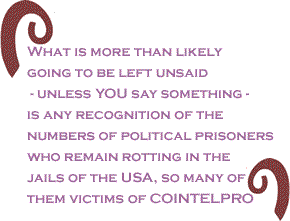Losing
Geronimo Ji Jaga Pratt the week after the loss of Gil Scott-Heron
felt like a body blow. As of this writing, no indication
has been offered as to what led to Geronimo's death.
 For
most of us who came of age politically in the late 1960s/early
1970s, Geronimo held a special place. His role in the Black
Panther Party, his survival of the split in the Panthers
with his integrity intact, and his ability to sustain himself
and his commitment over the 27 years of fraudulent imprisonment
all spoke to his remarkable character. For
most of us who came of age politically in the late 1960s/early
1970s, Geronimo held a special place. His role in the Black
Panther Party, his survival of the split in the Panthers
with his integrity intact, and his ability to sustain himself
and his commitment over the 27 years of fraudulent imprisonment
all spoke to his remarkable character.
It
was in reading various obituaries
that I found myself thinking and rethinking the circumstances
of Geronimo's imprisonment. It was not just the facts of
the case but rather the context. This all returns me to
the film I reviewed for BC a few weeks ago about COINTELPRO.
For
those who missed my column
or are too young to remember COINTELPRO, that was the FBI's
operation aimed at disrupting domestic political organizations
that it judged to be threats to national security. During
the 1960s, COINTELPRO focused on various social movements,
including but not limited to the African American movement.
Within the African American movement, the Black Panther
Party was an important target for the FBI.
The
death of Geronimo needs to be a moment to not only mourn
a courageous fighter but to instruct those who have or have
had such strong illusions about the nature of democracy
in the USA about one of the means through which dissent
is and has been handled. Through the false testimony of
a reported FBI informant, Geronimo was convicted and could
have been given the death penalty. As it was, he lost 27
years of his life, all because of COINTELPRO.
At
the height of the Panther's influence and note, it was quite
common for those who warned of the danger of police/government
infiltration of the Black Freedom Movement to be condemned
as paranoid and chicken-littles. Yet the murder of Chicago
Panther leader, Fred Hampton, and the imprisonment of Geronimo
Pratt, to name only two victims of COINTELPRO, turned out
to be startling evidence of relentless and uncontrolled
use of the mechanisms of repression that the State was prepared
to go to in the name of national security, but in fact as
a means to crush dissent.
 In
the aftermath of Geronimo's death there will be many tributes,
and so there should be. But what is more than likely going
to be left unsaid - unless YOU say something - is any recognition
of the numbers of political prisoners who remain rotting
in the jails of the USA, so many of them victims of COINTELPRO
or COINTELPRO-like operations. When many such individuals
were first imprisoned, their names were emblazoned on the
covers of left-wing and other newspapers and magazines.
In some cases there were defense committees established
to win their freedom. But as year after year passed, and
as the 70s became the 80s and the 80s became the 90s� too
many of these political activists - now political prisoners
- sat forgotten. In
the aftermath of Geronimo's death there will be many tributes,
and so there should be. But what is more than likely going
to be left unsaid - unless YOU say something - is any recognition
of the numbers of political prisoners who remain rotting
in the jails of the USA, so many of them victims of COINTELPRO
or COINTELPRO-like operations. When many such individuals
were first imprisoned, their names were emblazoned on the
covers of left-wing and other newspapers and magazines.
In some cases there were defense committees established
to win their freedom. But as year after year passed, and
as the 70s became the 80s and the 80s became the 90s� too
many of these political activists - now political prisoners
- sat forgotten.
Geronimo,
through the shrewd legal work of the late Johnny Cochran
and the countless individuals who never gave up on him,
won his freedom. But he was only one.
As
we remember Geronimo, let us regain our memory of those
others who also put their lives on the line for freedom,
often to be set up by the State as a way of getting them
off the scene. That may be the best way to honor Geronimo.
 BlackCommentator.com Editorial Board member, Bill Fletcher, Jr., is a Senior Scholar with
the Institute for
Policy Studies, the immediate past president of TransAfricaForum and co-author of Solidarity Divided: The Crisis in Organized Labor and a New Path
toward Social Justice (University of California Press), which examines
the crisis of organized labor in the USA. Click here to contact Mr. Fletcher. BlackCommentator.com Editorial Board member, Bill Fletcher, Jr., is a Senior Scholar with
the Institute for
Policy Studies, the immediate past president of TransAfricaForum and co-author of Solidarity Divided: The Crisis in Organized Labor and a New Path
toward Social Justice (University of California Press), which examines
the crisis of organized labor in the USA. Click here to contact Mr. Fletcher.

|

